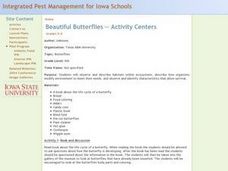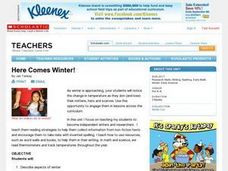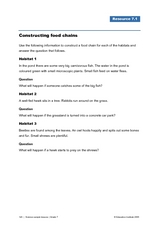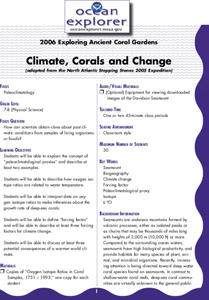Curated OER
Droplets and Downpours
Students explore how storm water flows through different habitats by sketching the slope of their yard, compare runoff for erosion, and create a sand castle. In this storm water lesson plan, students measure where their yard started...
Curated OER
Mapping The Ocean Floor
Young scholars explore and analyze the bottom structure of underwater habitats. They describe and explain what can't see through the collection and correlation of accurate data. Learners assess that technology is utilized as a tool for...
Curated OER
Beautiful Butterflies - Activity Centers
Students describe habitats within ecosystems, describe how organisms modify environment to meet their needs, and identify characteristics for butterfly survival. For this butterfly lesson plan, students explore all aspects of the...
Curated OER
Here Comes Winter!
Students investigate winter behaviors in animals. They describe winter and write about the characteristics of the season by drawing and labeling a winter picture. Students then conduct research on a chosen animal and create a chart. ...
Curated OER
3rd grade life science
In this life science worksheet, 3rd graders answer multiple choice questions about plants, birds, habitats, and more. Students complete 20 questions.
Curated OER
Corals & Coral Reefs
Students describe a coral reef, how it is formed and its inhabitants. They explain the ecological and economic importance of coral reefs and discuss its present-day threats. Lesson contains adaptations for all levels.
Curated OER
Describing the Physical Features of the Habitat
In this habitat activity, students describe the physical features of the habitat. Students list information for the lay of the land, amount of water, tree features, elements exposure, and farming effects.
Curated OER
Exploring Deep Ocean Habitats: Alien Invasion
Students compare and contrast "alien species" and "invasive species."Students explain positive and negative impacts associated with introduction of non-native species, and give a specific example of species that produce t
Curated OER
Constructing Food Chains
Young scholars explore different habitats and the food chains within. In this food web lesson students construct food chains for different habitats.
Curated OER
Pond Water
Students explore a creek environment. They make observations, identify the living and nonliving factors in the environment and collect a plankton sample to take back to the classroom. In addition, they look at plankton under a microscope.
Curated OER
Treasures in Jeopardy
Young scholars study how coral reefs can be protected from humans and their activities. In this conservation instructional activity students explain the benefits of coral reefs and what humans can do to help protect them.
Curated OER
Design a Reef!
Students explore coral reef ecosystems. In this ecosystems science instructional activity, students research coral reef ecosystems to determine the major functions the participating organisms must perform. Students construct...
Curated OER
Faking It
Middle school earth scientists describe the behavior of the Coriolis force. They compare and contrast conditions under which the Coriolis force has a significant impact with conditions under which it has very little. They model the...
NOAA
Climate, Corals and Change
Global warming isn't just an issue on land; deep ocean waters are also showing troubling signs. Young scientists learn more about deep water corals and the many recent discoveries researchers have made. Then they examine data related to...
Curated OER
Praire Biome Models
Fifth graders, in groups, list the physical characteristics of a biome and think of ways in which animals might have to adapt to live there and make a biome mobile ball that show the different types of habitats that shape the praire biome.
Nature New Brunswick
Habitat for Endangered Wildlife and You
Compare and contrast your habitat with that of endangered plants and animals! Learners discuss what a habitat is actually comprised of, describing what theirs looks like. They fill out a graphic organizer explaining what they eat, how...
Indian Land Tenure Foundation
Relationships to Places
Young historians take a look at how the Indian tribes of California promoted a mindful relationship between people and the land. They begin to understand how the Indians were champions of conservation, and at preserving the natural...
Curated OER
How Diverse is That?
Compare various types of biological diversity in a coral reef and calculate a numeric indicator that describes the diversity found in coral communities. Your class can work in groups to look at the abundance and distribution data of...
Curated OER
Writing Process- Expository Writing
Expository writing is the focus of the language arts lesson plan presented here. In it, young writers review what expository writing is through a class discussion and teacher demonstration. Then, learners write expository text that...
Curated OER
Wetland Metaphors
Young scholars describe the characteristics of wetlands and identify their ecological functions. They inspect items and use them to create metaphors about wetlands.
American Museum of Natural History
Microbes Coloring Book and Scavenger Hunt
Coloring pages showcase microbes—bacteria, viruses, and protists. Scholars have the option to download a coloring book and scavenger hunt or color the page directly on the computer. Three paragraphs describe each microbe.
Curated OER
Habitat Is Home
Students are introduced to the concept and components of a habitat. They discuss the key components of a habitat and describe how certain factors can cause disturbances in a habitat and change its population. Activities are leveled for...
Curated OER
Changing State
Students identify the changing states of water, water vapor and ice in the water cycle They investigate how each of these stages can be reversible. Students complete a worksheet describing the water cycle.
Curated OER
Entering the Twilight Zone
Students describe major features of cold seep communities and list organisms that are found in these communities. In this water habitat lesson students examine trophic levels, describe the process of chemosynthesis and list...

























